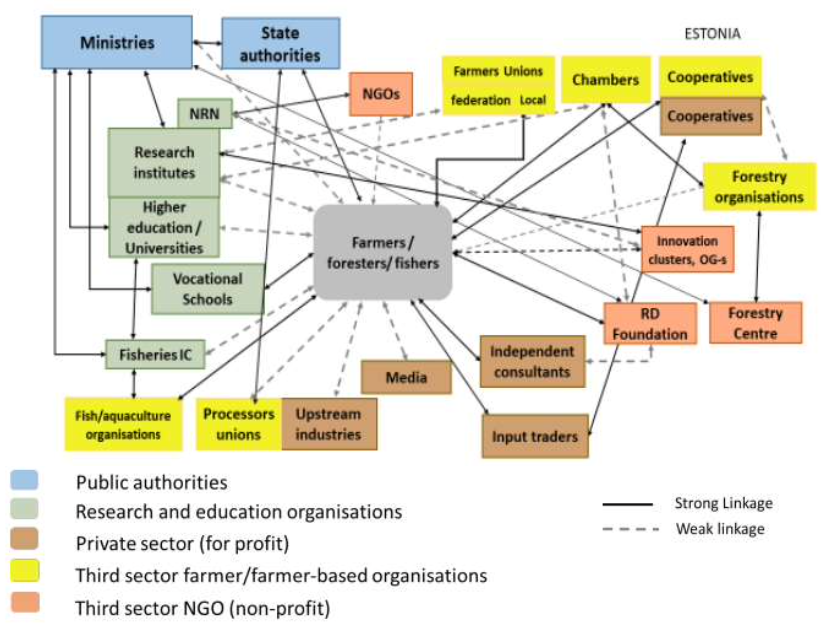2023
AKIS coordination bodies
governance

So far, the Estonian AKIS has had a rather fragmented image. However, important steps towards greater integration have been taken during the 2014-2020 programming period (e.g. nationwide coordination of supported advisory services, etc). To a certain extent, fragmentation has been fostered by the current structure of the support measures, with (sub-)activities being targeted at narrowly defined target groups. Thus, there have been separate support measures for advisory services, for knowledge transfer, for innovation cooperation, but few opportunities to provide, for example, joint training seminars for advisors and researchers or otherwise to strengthen cooperation and contacts between them, or to promote cooperation and information exchange between.
The main characteristics of Estonian AKIS can be summarized as follow:
Considering such a context, one of the orientations for the new period will be to strengthen the common information space between the different actors involved in the AKIS, to enable joint activities involving different actors, and to allow for a more efficient, holistic planning of AKIS activities and the consolidation of relevant information and opportunities in a single online repository.
Figure 1: Estonian AKIS Diagram

Source: i2connect AKIS country report (2020)
The political relevance given to AKIS strategies in the context of the CAP Strategic Plans (SPs)2023-2023 has certainly highlighted the opportunity of defining governance bodies aimed at coordinating the AKIS-relating interventions and actors in view of their better implementation and contribution to the cross-cutting and specific objectives of the CAP SPs.
Particularly, the AKIS coordination body is indicated by the CAP SP 2023-2027 as a point of contact of the European Commission and of the European CAP Network.
The lack of a clear definition of role and functions of the institute of the AKIS coordination bodies by the EU regulation has certainly favored the managing authorities of the CAP SPs in identifying the configurations that best fit the needs for governance of the AKISs and the expectations of the respective actors.
In the case of Estonia, the establishment of the holistic AKIS coordination body addressed the horizontal need to increase the knowledge base and cooperation between AKIS actors. A unit organizing knowledge related services all over Estonia would reduce the fragmentation and duplication of specific knowledge creation and transfer, advisory and brokering services.
The AKIS coordination is established around two bodies: the Research and Development Department of the Ministry of Regional Affairs and Agriculture (REM) and Maaelu Teadmuskeskus (METK, Centre of Estonian Rural Research and Knowledge).
The function of the AKIS coordination body in the managing authority is performed by the Research and Development Department of the Ministry of Regional Affairs and Agriculture (REM), as stated in CAP SP section 8.1. In the coordination structure of AKIS, the ministry has the role of policy maker for enabling legislation. There are 10 people working in R&D department, from which the advisor is the contact person for the AKIS topic.
The operational actions of AKIS coordination are appointed to Maaelu Teadmuskeskus (METK), a semi-governmental research and development agency officially appointed on by the Estonian Ministry of Regional Affairs and Agriculture to act as a National AKIS Operational Centre for CAP 2021+ period. METK itself is an example of multi-actor entity: it covers research units, laboratories, and field trial centres along with national rural network, innovation, and advisory services. The nomination of METK to this role is provided in the national CAP law and described in more details in implementation act signed at 30th May of 2023.
The AKIS centre acts as a support unit ensuring the daily coordination and actions for all AKIS organisations. The main objective of the AKIS action plan in Estonia is to increase productivity and innovation capacity in the agricultural sector. To achieve this objective, the main tasks will be to develop and coordinate a coherent AKIS system, strengthening the role of advisors in the AKIS health system and raising public awareness of the opportunities offered by the knowledge transfer and innovation system. The back-office for advisory services will be fully integrated to METK/AKIS centre by 2024 as the ongoing public procurement obligation ends.
Main contact point for AKIS is appointed to the Department of Networks within METK, although total of 8 FTE persons are working in several different units towards healthy AKIS ecosystem. The concept of AKIS center is a new institution, but it is built on the basis of existing structures and functions. Firstly: the tasks of the Estonian National CAP Network support unit (NSU) is executed by the same department in METK (nominated in the regulations for the third RDP/CAP period, no procurement). Secondly: multi-actor knowledge transfer programme for agriculture, food and the rural economy since 2021 is led by the same department in METK. The project implemented by multi-actor consortia of information action providers, covers most nationally supported knowledge transfer actions (M01 in RDP, public procurement) with the goal to provide more efficient and coherent information and knowledge flows to the agricultural and food sector. During the implementation of the programme, the concept of AKIS has been observed and put in practice as much as possible already before the official start of AKIS centre.
The R&D department at the Ministry plays a policy-making role by designing the strategy for AKIS strengthening and providing guidance to ensure that the activities of the AKIS centre on knowledge transfer, advice and innovation are in line with the overall national and EU objectives.
The AKIS centre is in charge of the day-to-day organisation of knowledge transfer and advisory activities and the mapping of future needs. This is done in cooperation with representative organisations in the sector, regional organisations, etc. to ensure that the practical needs of the sector are taken into account.
The goals of AKIS coordination actions are described in the action plan for the whole CAP period, and the long-term perspective goals for AKIS will be described in the development plan beyond the period of 2023-2027. On the basis of the input gathered from the various stakeholders, the AKIS centre draws up annual implementation plans (including budgetary needs) that will be submitted to the R&D department at the Ministry for approval.
The tasks of the AKIS centre, in relation to its role as a component of the AKIS coordination body are:
As a component of the AKIS coordination body, the National CAP network plays the following tasks:
As a a component of the AKIS coordination body, the AKIS Council plays the following tasks:
Before the implementation of the AKIS center and the convening of the council, the steering role was performed by the thematic councils of the knowledge transfer program. In these councils, evaluations were also made about the needs of informtaion and the implementation of annual plans in the context of knowledge transfer activities. Knowledge transfer activities are organized by involving various parties both in the decision-making process and in the implementation of activities.
In summary there are three levels of planning:
The functions of the AKIS centre are stated in:
The AKIS Centre, the CAP network, knowledge transfer programme and operate under the same authority and their daily cooperation is inevitable and desirable. In terms of practical division of labor, the NSU focuses on all CAP measures as a whole, while the focus of the AKIS center is primarily on AKIS. In the performance of its tasks, the CAP network can use the possibilities of the AKIS digital knowledge platform, the contact network and expert information, but at the same time, it can offer support in introducing Estonia's most successful CAP-funded projects and other activities through the pan-European CAP network.
The R&D department at the Ministry is a contact point in policy level for European Commission and government of Estonia, reporting indicators and overall performance. The AKIS centre and CAP network are implementing the actual networking within the country and among peers in other countries. There are several councils for different occasions (also at Ministry) to ensure, that the practical needs and EU developments are affordable and in correspondence to the rural stakeholders.
Based on successful implementation of the CAP/Rural Network and RDP knowledge transfer programme call, METK as a semi-governmental research and development agency was officially appointed by the Estonian Ministry of Regional Affairs and Agriculture to act as a National AKIS Centre.
The concept to AKIS coordination for the whole country is a unique holistic way to approach the needs and elaborate cooperation between agricultural and rural stakeholders (farmers, food processors, local ambassadors, researchers, advisors, officials etc).
The lessons learnt from knowledge transfer programme show, that cooperation happens only via real actions, not only in councils and working groups. Long-term programming with a multi-actor organisations is big step towards developing a co-creative mind-set amongst knowledge providers (rural university, research stations, farmers organisations, professional associations, governmental institutions, vocational schools, advisory organisations etc) in Estonia.
The safety of decision described firmly in law, puts AKIS connections in practice in a systemic way. It enables to invest methodologically and systematically into the skills development and capacity building of the facilitators. The knowledge, how to manage and maintain networking is a set of personal characteristics and methodological skills.